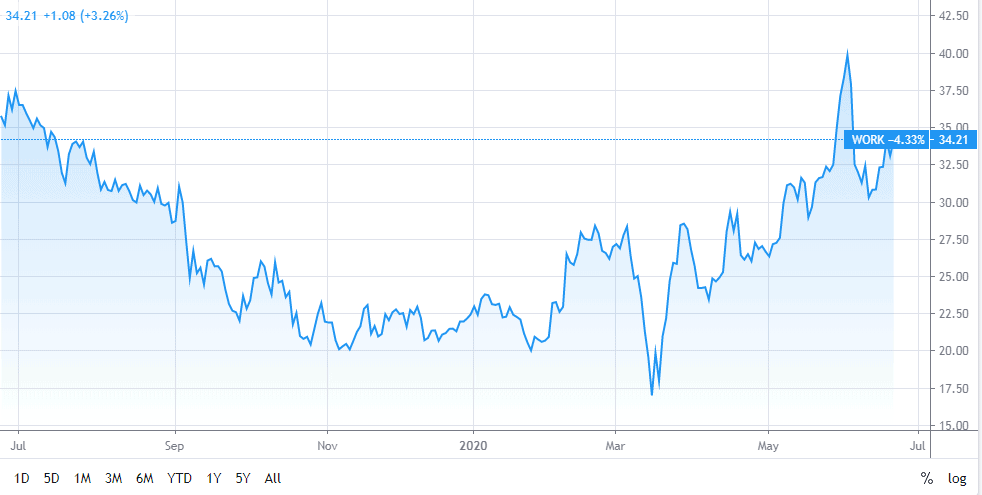You can check out a list of recommended stock brokers if you want to invest in stocks.
The battle between Microsoft and Microsoft messaging rival Slack is stirring up as camps start forming. On Friday, investment bank Goldman Sachs downgraded Slack’s stock to sell because of what it expects to be an “enduring battle” for customers between the two messaging apps.
That saw Microsoft messaging rival Slack’s stock go down 2.7%, to $33.31 the same day.
Despite Slack being a near-term beneficiary of the working-from-home environment, a potentially enduring battle with Microsoft (MSFT) Teams over market share is what caused the change of rating and cautionary outlook.
Goldman Sachs analyst Heather Bellini says she views Slack as the “best-in-class team messaging offering.” But she thinks Microsoft will push to package Teams with Office 365 to drive adoption—an approach that can possibly hamper Slack’s long-term growth rate.
Additionally, there is also the risk of “elevated churn” over the next 12 months due to a combination of factors that Microsoft messaging rival Slack shared on its most recent earnings call, including substantial exposure to small businesses, and midteens exposure to travel and other industries that have been severely impacted by the pandemic.
Slack’s stock currently trades at 18 times calendar 2020 estimated billings—and 13 times those of calendar 2021—something that Bellini sees “as having the potential to relatively underperform.”
Other analysts seem to agree with her prognosis. Despite Microsoft messaging rival Slack having ‘better technology’, “[Microsoft’s] 258 million [user] installed base and the fact that they’re focused on growing this business has shown up in the recent numbers” Nancy Tengler, chief investment officer at Laffer Tengler Investments told CNBC’s “Trading Nation” on Friday, also citing a recent The Wall Street Journal article about cloud payments taking a hit as a result of the economic slowdown.
Wall Street traders are also taking sides concerned with Slack’s exposure to the small business space where 25% of its revenue comes from.
“Slack has 25% of their revenue exposure in the small business space,” the likeliest group to forgo payments, Tengler said.
“In March and April, Microsoft’s growth was tenfold that of Slack’s. Compare that to 2018, when Slack was at fourfold growth faster than Microsoft. We own Microsoft. We like it here. It’s got a lot of levers to pull. So, I’d make that swap as an investor” she added.
Other analysts continue to see potential in Slack’s scalable model and stock value resilience.
“The chart itself is making a big rounding bottom,” Craig Johnson, senior technical research analyst at Piper Sandler, said. “Yeah, it’s pulled back here a little bit, but from our perspective, this is a pullback you want to buy.”
Johnson added that Slack’s 114% rally from its March lows “doesn’t concern” him when evaluating the stock.
“It’s a long-term growth story and they are winning some large customers,” he said. “Verizon and other companies like that are buying this service. So, it’s a stock, for us, that we should be buying.”
Trusted & Regulated Stock & CFD Brokers
What we like
- 0% Fees on Stocks
- 5000+ Stocks, ETFs and other Markets
- Accepts Paypal Deposits
Min Deposit
$200
Charge per Trade
Zero Commission on real stocks
64 traders signed up today
Visit Now67% of retail investor accounts lose money when trading CFDs with this provider. You should consider whether you can afford to take the high risk of losing your money.
Available Assets
- Total Number of Stocks & Shares5000+
- US Stocks
- German Stocks
- UK Stocks
- European
- ETF Stocks
- IPO
- Funds
- Bonds
- Options
- Futures
- CFDs
- Crypto
Charge per Trade
- FTSE 100 Zero Commission
- NASDAQ Zero Commission
- DAX Zero Commission
- Facebook Zero Commission
- Alphabet Zero Commission
- Tesla Zero Commission
- Apple Zero Commission
- Microsoft Zero Commission
Deposit Method
- Wire Transfer
- Credit Cards
- Bank Account
- Paypall
- Skrill
- Neteller
What we like
- Sign up today and get $5 free
- Fractals Available
- Paypal Available
Min Deposit
$0
Charge per Trade
$1 to $9 PCM
Visit Now
Investing in financial markets carries risk, you have the potential to lose your total investment.
Available Assets
- Total Number of Shares999
- US Stocks
- German Stocks
- UK Stocks
- European Stocks
- EFTs
- IPOs
- Funds
- Bonds
- Options
- Futures
- CFDs
- Crypto
Charge per Trade
- FTSE 100 $1 - $9 per month
- NASDAQ $1 - $9 per month
- DAX $1 - $9 per month
- Facebook $1 - $9 per month
- Alphabet $1 - $9 per month
- Telsa $1 - $9 per month
- Apple $1 - $9 per month
- Microsoft $1 - $9 per month
Deposit Method
- Wire Transfer
- Credit Cards
- Bank Account





